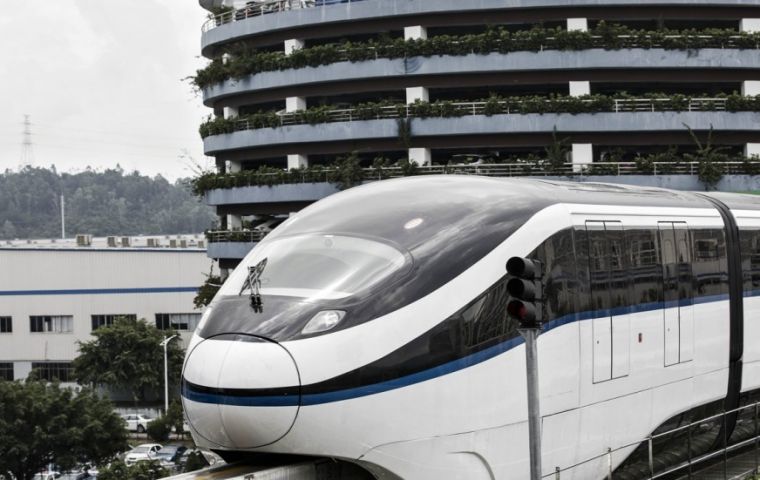MercoPress. South Atlantic News Agency
China electric monorail system, cheaper than metro, for a major Brazilian city
 Construction in Salvador will start on the 20-kilometer route this year, and it’s expected to begin operations in 2021.
Construction in Salvador will start on the 20-kilometer route this year, and it’s expected to begin operations in 2021. BYD, China’s biggest electric vehicle maker by sales, signed a 2.5 billion Brazilian real (US$ 689 million) deal this week to build a monorail system in Brazil’s Salvador city, the firm said. It’s the company’s biggest overseas monorail investment yet, according to a company spokesperson. Construction will start on the 20-kilometer route this year, and it’s expected to begin operations in 2021.
It’s the clearest sign yet of the car maker’s global ambitions to provide public transport to governments worldwide, as China’s booming electric car market becomes increasingly competitive. The firm has signed a slew of monorail deals with countries including the Philippines, Egypt, Cambodia, and Morocco. It is also in talks over eight monorail deals in North and South America, including the US, according to the spokesperson.
The deal comes at a critical time for the electric vehicle maker, whose profits have been undermined as China slashed generous state subsidies to electric vehicle makers starting last year. The firm attributed its 83% decline in net profits to US$ 16 million in the first quarter of this year to the subsidy cuts.
The country still offers subsidies, but is raising the bar (pay-wall) for car makers. For instance, as of February, vehicles have to be able to travel 150 kilometers on a single charge to qualify, up from 100 kilometers in the past. The country plans to end the subsidies by 2020 and instead use a system where car makers will earn credits based on range and efficiency.
Stella Li, a vice president in BYD’s Los Angeles office, said she expects the firm’s overseas business to break even this year. BYD is “about to enter the harvesting stage, with the overseas business starting to make profit and even leading the company’s growth”.
Li’s remarks reflect BYD’s aggressive overseas expansion in multiple areas, led by its electric buses, which it supplied to the city of Shenzhen’s all-electric fleet. The firm has been selling buses to countries like the US, Japan, South Korea, and Portugal. It also sells electric trucks to Brazil and electric taxis to Thailand.
Monorails make up an essential part of BYD’s global strategy. After debuting in Germany over a century, they were only able to occupy a very specific niche market, hauling tourists through parks and zoos, but are now filling a coveted spot in urban transport: cheap, fast and electric. That’s something BYD can provide with its core battery technology which it’s already using to build monorails for over 20 cities.
Monorail systems are generally cheaper than metro. The firm says it costs some US$ 30 million a kilometer on average to build a monorail in China, around one-third of the cost for a subway, and expects costs to be similar in Brazil. BYD will take 95% of the income generated by the Brazil project, such as advertisements, while the rest goes to the government, according to the spokesperson.




Top Comments
Disclaimer & comment rules-

-

Read all commentsREF: “CHEAPER than metro”: Remember the Cheaper Nuclear Energy “CHEAPER than the conventional one”? Billions were spent and still, the nuclear reactors are not even able to re-charge smartphones!
May 26th, 2018 - 12:09 pm 0Exactly the SAME way, this “Project” too, is for making the offshore accounts of many - too many - to overflow! And the final result - like too MANY other rackets - will be The Most EXPENSIVE Monorail in the WORLD!
https://image.iol.co.za/image/1/process/620x349?source=https://inm-baobab-prod-eu-west-1.s3.amazonaws.com/public/inm/media/2018/02/24/iol/948/PF-IOL-save2.jpg&operation=CROP&offset=0x74&resize=886x496
Are you Briton's heir?
May 27th, 2018 - 04:12 pm 0Commenting for this story is now closed.
If you have a Facebook account, become a fan and comment on our Facebook Page!